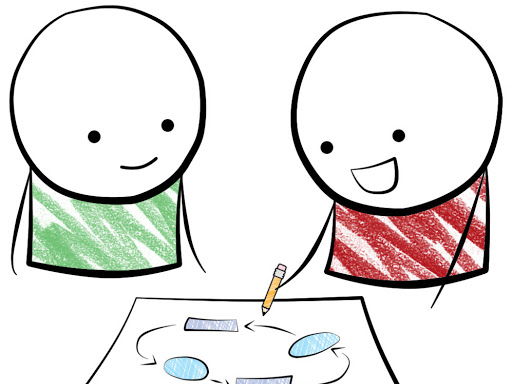Supporting Learning Through Peer and Self-Assessment
Assessment is usually something we view as the job of the teacher. While it is true that the teacher designs and directs assessment, our assumptions about assessment also point us to the role that students can play in the process.

The activities suggested in my previous post about formative assessment could be extended to include activities that encourage students to be consciously reflective about what they are learning and how (i.e. self-assessment), and activities that involve students in providing feedback to each other (i.e. peer assessment).
Self-assessment helps students take ownership of their learning, and to be more intentional and focused. If shared with the teacher, it can provide insightful windows into the student’s thinking that help plan further instruction. Here are a few examples of reflective activities that I have tried…
– A learning journal, where students respond to questions that I write on the board, dating each entry so that it becomes a narrative of their learning. The questions can ask them to write about the significance of what they are learning, the strategies they used to learn it, and what they would like to learn more about.
– Interactive notebooks, where students record the factual information they are learning on one side of each page, then write their reflections about that information on the opposite side.
– Reflection questions that students respond to after completing an assignment, that then become part of the assignment. The questions can include asking the student to reflect on the process they used to complete the assignment, as well as the result.
– Exit tickets, where students respond to a question related to the lesson content on a small slip of paper at the end of the lesson and hand it to the teacher as they leave the room.
– Online discussion forums, where students can summarize what they have learnt and comment on the key points raised by others.
What other ideas do you have to help students practice reflective learning?
I was recently challenged (through an online discussion forum) to consider how to make these reflective practices more co-operative, so that students also reflect as a group. This would overlap with the idea of peer assessment…

Peer assessment can indeed be tricky. There is the possibility of students providing quite unhelpful feedback to each other, and students are often concerned that the “critique” of their peers will affect their grade. However, it is my belief that the risk is worth it. Being able to graciously give and receive feedback is a significant learning and life skill. The teacher can provide clear structures and guidelines for peer assessment to help students develop this skill, and reassure students that the feedback they receive is not a grade. Simple rubrics for students to complete after reviewing the work of their peers, with clear statements about what students are to give feedback on, are helpful.
What other strategies for peer assessment have you tried?
Comments
 Roslyn Barnes
Roslyn Barnes
AuthorThis is a helpful short video on the reasons for self and peer assessment and how they can be implemented in the classroom. https://www.youtube.com/watch?v=8WxvVgXC_NY